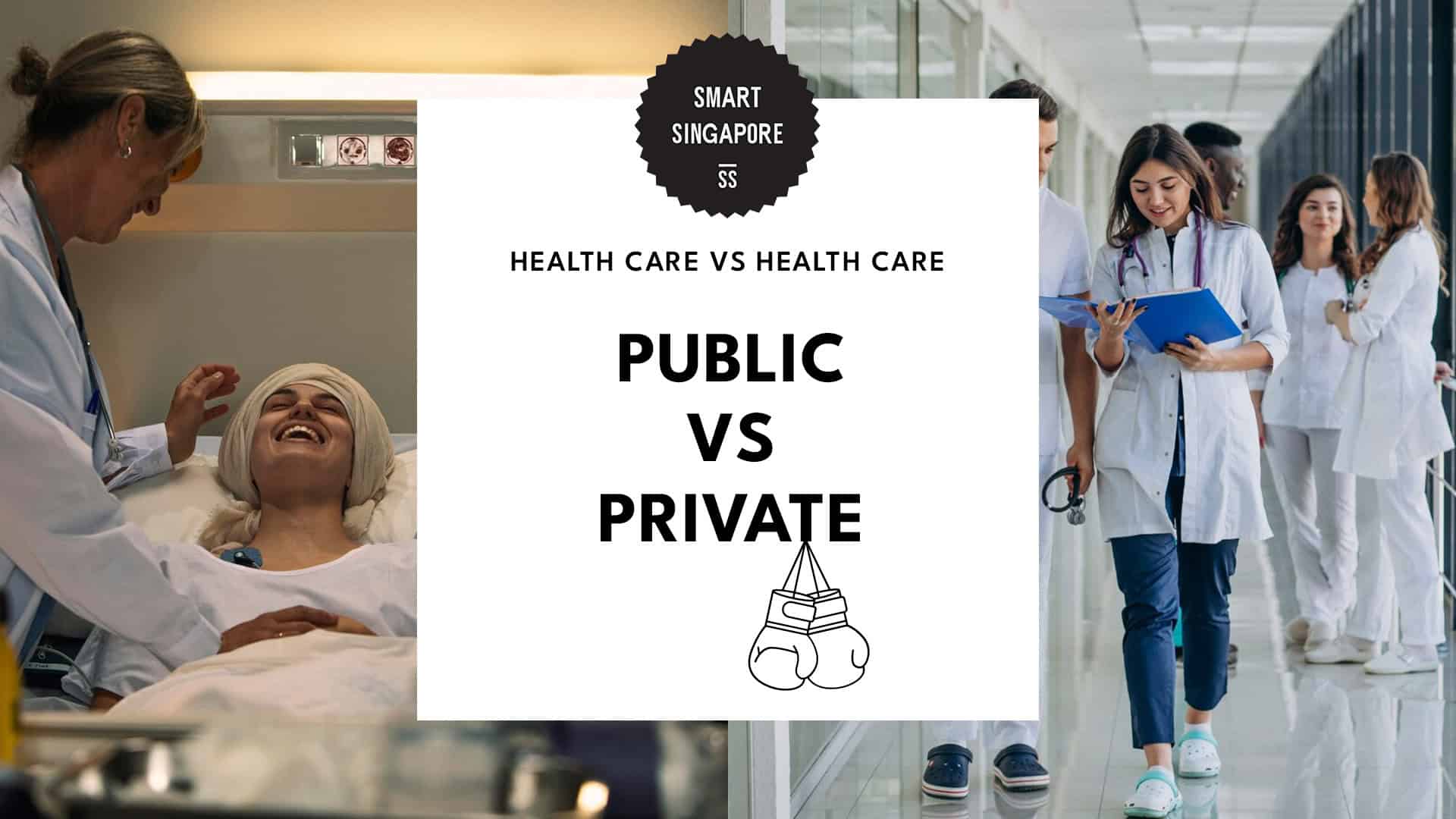Categories > Guides and Tips

Public vs Private Healthcare in Singapore: Which should you choose?
- An Overview of Healthcare in Singapore
- What is the difference between public and private healthcare in Singapore?
- Are private hospitals better in Singapore?
- Is there healthcare for foreigners in Singapore?
- Types of Healthcare Facilities and Services in Singapore
- Public/Restructured Hospitals
- Private Hospitals
- Which hospital is the best in Singapore?
- Polyclinics
- Clinics
- Options for Financing Healthcare in Singapore
- Public Healthcare Financing
- MediSave
- MediShield Life
- MediFund
- Private Healthcare Financing
- Integrated Shield Plans
- Critical Illness Insurance
- Maternity Insurance
Singapore is known for its top-tier healthcare system, consistently ranked among the best globally. The city-state offers cutting-edge facilities, highly trained professionals, and comprehensive services for both locals and expatriates.
Choose public healthcare if you’re looking for affordable and widely accessible services due to government subsidies. On the other hand, private healthcare offers faster access, personalised attention, and luxurious facilities for those willing to pay more for enhanced convenience and comfort.
Whether you choose public or private healthcare, you’ll receive excellent care, quick treatments, and a strong focus on patient well-being. This guide will help you understand the differences, aiding in your decision-making.
An Overview of Healthcare in Singapore
What is the difference between public and private healthcare in Singapore?

In Singapore, both public and private healthcare options offer high-quality services, but they differ in several key aspects. Let’s compare them point by point.
| PUBLIC HEALTHCARE | PRIVATE HEALTHCARE |
| Cost: More affordable, subsidised by the government | Cost: Generally more expensive, with fees charged at market rates |
| Facilities: Modern and well-equipped but may have longer waiting times | Facilities: Typically more luxurious with shorter waiting times |
| Specialists: Access to a broad range of specialists, but appointments might take longer to schedule | Specialists: Faster access to specialists and a broader choice of doctors |
| Insurance: Medisave, Medishield Life, and government subsidies can be used | Insurance: Private insurance plans are often required, and out-of-pocket expenses can be higher |
Are private hospitals better in Singapore?

If you prioritise comfort, personalised care, and a choice of specialists, private hospitals are better for you. If not, both private and public systems are highly regarded for their quality of care.
Ultimately, choosing between the two depends on your budget, urgency of care, and personal preferences for comfort and convenience. The advantages of a private hospital in Singapore include the following:
✔ Shorter waiting times – Private hospitals generally offer quicker access to consultations and treatments.
✔ Personalised care – Patients often experience more personalised and attentive care, with a higher staff-to-patient ratio.
✔ Comfort and amenities – Private hospitals usually provide more luxurious facilities and accommodations.
✔ Choice of specialists – There’s greater flexibility in choosing specific doctors and specialists.
So is a private hospital cover worth it in Singapore? Ask yourself which you prioritise: speed and luxury (private) or affordability and comprehensive services (public)?
In public hospitals, the average cost for medical specialities ranges from S$1,012 to S$7,876, while surgical specialities range from S$1,638 to S$10,541.
In private hospitals, the average cost for medical specialities ranges from S$3,906 to S$24,687, and for surgical specialities, from S$8,109 to S$18,993 (data from SmartWeath).
Is there healthcare for foreigners in Singapore?

Singapore offers healthcare services for foreigners. They also come in the form of public and private healthcare.
For public healthcare, foreigners can access public hospitals and polyclinics but may face longer waiting times and higher fees. They also do not receive the same subsidies as citizens and permanent residents, so costs are higher.
According to Expat Living SG, an initial consultation fee can range from S$150 to S$ 200 for foreigners, compared to just S$39 to S$59 for citizens and permanent residents.
For private healthcare, many foreigners opt for private health insurance to cover medical expenses in private hospitals. They offer faster access to specialists, shorter waiting times, and more comfortable facilities, though at a higher cost.
Many employers provide health insurance for expatriate employees, and various private insurance plans are available. However, foreigners should have comprehensive health insurance to cover medical expenses.
Both public and private emergency services are available to foreigners. Emergency services are accessible, but costs will vary based on the hospital and the level of care required.
Types of Healthcare Facilities and Services in Singapore
Public/Restructured Hospitals

Public hospitals in Singapore, often referred to as restructured hospitals, are government-funded institutions that operate to provide accessible and affordable healthcare to the population.
Their features include the following:
✔ Subsidised care – Citizens and permanent residents receive substantial subsidies, which reduce the cost of medical services significantly. Patients can also use their Medisave savings and Medishield Life insurance to cover hospital expenses.
✔ A wider range of services – Public hospitals provide a full spectrum of medical services, including emergency care, specialist consultations, surgeries, and inpatient care. Numerous specialist outpatient clinics are available, covering various medical fields such as cardiology, oncology, orthopaedics, and more.
✔ Teaching hospitals – Many public hospitals are also teaching hospitals affiliated with medical schools. They play a crucial role in training future healthcare professionals.
✔ Modern facilities and technology – Public hospitals are equipped with state-of-the-art medical equipment and facilities to ensure high-quality care. The government continuously invests in upgrading the infrastructure and technology in public hospitals to meet the evolving healthcare needs.
✔ A cluster system – Public hospitals are part of healthcare clusters such as SingHealth, National Healthcare Group (NHG), and National University Health System (NUHS). This integration ensures coordinated and seamless care across different healthcare institutions.
Examples of public/restructured hospitals are Singapore General Hospital, the country’s largest and oldest hospital; National University Hospital, a teaching hospital affiliated with the National University of Singapore; and Tan Tock Seng Hospital which plays a vital role in disease management.
Private Hospitals

Private hospitals in Singapore offer high-quality healthcare services with a focus on personalised care, comfort, and convenience. These hospitals are known for their advanced medical technology, shorter waiting times, and luxurious facilities.
Their features include the following:
✔ Personalised care – There’s typically a higher staff-to-patient ratio in private hospitals. This patient-centric approach ensures more dedicated care and attention from healthcare professionals.
✔ Advanced facilities and technology – Private hospitals invest heavily in the latest medical technology and equipment, providing cutting-edge treatments and diagnostics. Facilities often include private rooms, suites, and high-end amenities such as Wi-Fi, entertainment systems, and personalised meals.
✔ Shorter waiting times – Patients experience shorter waiting times for consultations, treatments, and procedures compared to public hospitals. There’s easier and faster access to specialist consultations and elective procedures.
✔ Specialised services – Private hospitals offer a broad range of specialised medical services, including cardiology, oncology, orthopaedics, and more.
Some prominent private hospitals in Singapore include Mount Elizabeth Hospital, a specialist in cardiology, oncology, and neurology; Raffles Hospital, known for its comprehensive medical services; and Farrer Park Hospital, which offers a unique blend of medical care, hospitality, and technology.
Which hospital is the best in Singapore?

The best hospital in Singapore, according to Newsweek’s World’s Best Hospitals list for 2024, is Singapore General Hospital.
No less than ten hospitals rank high among other global medical institutions! Check it out:
| RANKING | HOSPITAL | SCORE |
| #1 | Singapore General Hospital (SGH) | 90.06% |
| #2 | National University Hospital (NUH) | 85.53% |
| #3 | Tan Tock Seng Hospital | 81.01% |
| #4 | Mount Elizabeth Hospital – Orchard | 80.59% |
| #5 | Changi General Hospital (CGH) | 76.71% |
| #6 | Gleneagles Hospital | 75.92% |
| #7 | Khoo Teck Puat Hospital & Yishun Community Hospital | 70.44% |
| #8 | Mount Elizabeth Hospital – Novena | 70.31% |
| #9 | Alexandra Hospital | 70.00% |
| Special citation | National Cancer Centre Singapore (NCCS) – Oncology |
Each hospital’s score is based on an online survey of over 85,000 medical experts, patient satisfaction surveys post-hospitalisation and metrics on hygiene and patient/doctor ratio.
It also includes a Statista survey on the use of Patient Reported Outcome Measures (PROMs), and standardised questionnaires completed by patients to assess their experiences and outcomes.
Polyclinics

Polyclinics in Singapore are designed to be the first point of contact for individuals seeking medical attention and play a crucial role in preventive healthcare, chronic disease management, and maternal and child health services.
Their features include the following:
✔ Comprehensive primary care – Polyclinics provide general medical consultations for acute and chronic conditions. They also include health screenings, vaccinations, and health education to promote preventive care in their services.
✔ Chronic disease management – Polyclinics are equipped to manage chronic diseases such as diabetes, hypertension, and high cholesterol. They offer regular monitoring and follow-up consultations to help patients manage their conditions effectively.
✔ Maternal and child health services – Polyclinics offer comprehensive care for expectant mothers, including prenatal check-ups and postnatal care. For kids, services include childhood immunisations, developmental assessments, and general paediatric care.
✔ Affordable services – Singapore citizens and permanent residents receive government subsidies, making services at polyclinics more affordable. Patients can also use Medisave for certain outpatient treatments and screenings at polyclinics.
✔ Convenient access – Polyclinics are strategically located across various regions in Singapore, ensuring convenient access for residents.
Some polyclinics in the country are SingHealth Polyclinics, National Healthcare Group Polyclinics, and National University Polyclinics. Located in residential areas, they provide easy access to primary healthcare services.
Clinics

Clinics in Singapore form an essential part of the healthcare system, providing a wide range of medical services to residents and visitors. These clinics vary from general practitioner (GP) clinics to specialist clinics, each catering to different healthcare needs.
There are several types of clinics in Singapore:
✔ General practitioner clinics – GP clinics offer primary healthcare services, including diagnosis and treatment of common illnesses, minor injuries, and preventive care. Routine vaccinations, health screenings, and medical check-ups are commonly provided.
✔ Specialist clinics – Specialist clinics offer advanced medical care in specific areas such as cardiology, dermatology, orthopaedics, and more. Patients are often referred to specialist clinics by GPs or other healthcare providers for more detailed investigations and treatments.
✔ Dental clinics – Services include routine dental check-ups, cleanings, fillings, extractions, orthodontics, and cosmetic dentistry. Some dental clinics also provide emergency dental care.
✔ Women’s health clinics – These clinics focus on women’s health issues, including prenatal and postnatal care, fertility treatments, and gynaecological services. Services include Pap smears, breast exams, and contraception advice.
✔ Paediatric clinics – Paediatric clinics specialise in medical care for infants, children, and adolescents, offering routine check-ups, immunisations, and treatment of childhood illnesses.
✔ Aesthetic clinics – These clinics provide a range of cosmetic procedures such as laser treatments, Botox, fillers, and skin rejuvenation therapies.
Raffles Medical Group, Healthway Medical Group, Parkway Shenton, and Q&M Dental Group are just some examples of well-known clinics across Singapore with different specialisations.
Options for Financing Healthcare in Singapore
Public Healthcare Financing
Public healthcare financing in Singapore is designed to ensure that all residents have access to affordable and high-quality medical care. The system relies on a mix of government subsidies, compulsory savings, and insurance schemes.
1. MediSave

MediSave plays a crucial role in Singapore’s public healthcare funding by serving as a mandatory medical savings scheme. It requires working citizens and permanent residents to set aside a portion of their income for a dedicated MediSave account.
These savings can be used to cover a wide range of medical expenses, including hospitalisation, surgery, and certain outpatient treatments.
It helps ensure that individuals have the financial resources to pay for their healthcare needs, reducing out-of-pocket expenses and providing a safety net for medical costs.
2. MediShield Life

MediShield Life is a universal health insurance scheme in Singapore designed to cover large hospital bills and costly outpatient treatments such as dialysis and chemotherapy.
It provides lifetime protection for all Singapore citizens and permanent residents, regardless of age or health conditions.
MediShield Life helps reduce out-of-pocket expenses by covering a significant portion of the medical costs, thus ensuring that healthcare remains affordable and accessible to everyone.
3. MediFund

MediFund is an endowment fund established by the Singapore government to assist citizens who are unable to afford their medical expenses despite subsidies and other funding schemes like MediSave and MediShield Life.
It acts as a financial safety net, ensuring that no Singaporean is denied necessary medical care due to financial constraints. MediFund covers medical bills for both inpatient and outpatient treatments, providing additional support to those in need.
Private Healthcare Financing
Private healthcare financing in Singapore offers individuals additional options beyond the public healthcare system, providing access to a wider range of services, shorter waiting times, and more personalised care.
1. Integrated Shield Plans

Integrated Shield Plans (IPs) significantly enhance Singapore’s healthcare system by offering additional medical insurance coverage on top of MediShield Life.
These private insurer plans provide more comprehensive protection, covering a larger portion of hospital bills and offering access to private hospitals and higher-class wards in public hospitals.
Their key features include the following:
✔ Enhanced coverage – IPs cover the cost of treatment in Class A/B1 wards in public hospitals and provide options for private hospital care. They extend the coverage limits beyond what MediShield Life offers, including higher annual claim limits and more extensive coverage for specific treatments.
✔ Private hospital access – Policyholders can choose to receive treatment in private hospitals, benefiting from shorter waiting times and more personalised care.
✔ Additional benefits – Some IPs include extra benefits such as pre-and post-hospitalisation coverage, outpatient treatments, and emergency overseas medical treatment.
✔ Rider options – Policyholders can purchase riders to further reduce out-of-pocket expenses, such as deductibles and copayments, although recent regulations have introduced co-payment requirements to manage overall healthcare costs.
2. Critical Illness Insurance

Critical illness insurance is crucial in Singapore’s healthcare financing, offering a lump-sum payout upon diagnosis of specific serious conditions. This helps individuals manage high treatment and recovery costs effectively.
Its key benefits include the following:
✔ Financial support – It provides a one-time cash payout upon diagnosis of covered critical illnesses, such as cancer, heart attack, stroke, and kidney failure. This payout can be used at the policyholder’s discretion to cover medical expenses, ongoing care, and other financial needs.
✔ Comprehensive coverage – It covers a broad spectrum of critical illnesses, offering financial protection against a variety of severe medical conditions. It also complements other health insurance plans, such as MediShield Life and Integrated Shield Plans, by providing additional funds to cover expenses not fully addressed by standard health insurance.
✔ Usage flexibility – The lump-sum payout can also be used for non-medical expenses, such as household bills, mortgage payments, or even alternative treatments, providing comprehensive financial relief during a challenging time.
✔ Peace of mind – It offers peace of mind by ensuring that individuals are financially prepared to handle the high costs associated with critical illnesses, allowing them to focus on recovery without the added stress of financial burdens.
3. Maternity Insurance

Maternity insurance plays a critical role in Singapore’s healthcare system by providing financial protection for expectant mothers against the high costs of prenatal, delivery, and postnatal care.
Its key roles and benefits include the following:
✔ Financial coverage – It can cover routine check-ups, ultrasounds, and necessary tests throughout pregnancy. This also includes expenses for childbirth, whether it is a natural delivery or a caesarean section, in both public and private hospitals, as well as postnatal care.
✔ Complications and emergencies – It offers financial protection for both the mother and baby in case of pregnancy-related complications, ensuring access to necessary medical care without financial stress. Some plans also cover congenital conditions or illnesses diagnosed in the newborn, providing immediate medical intervention.
✔ Peace of mind – By covering a significant portion of maternity-related expenses, it allows parents to focus on the well-being of the mother and child without worrying about high medical bills.
✔ Enhanced care options – It provides the option to choose private healthcare facilities, which may offer more personalised care and luxurious amenities during childbirth.





